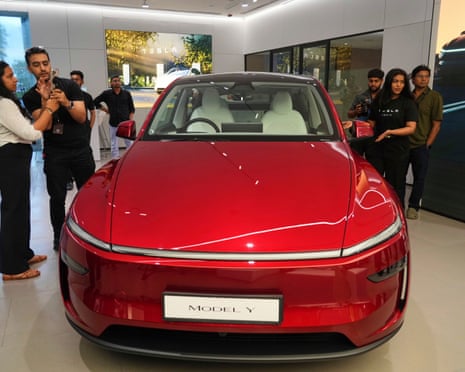Tesla’s European sales down a third in 2025
It is not just British carmakers who are struggling: Tesla’s European sales are down a third this year, as total new car sales across the EU fell by 7% in June.
Tesla’s European sales have slumped 33% during the year so far to 110,000 compared with 165,000 in the first half of 2024, according to new data from the European Automobile Manufacturers Association (ACEA), a lobby group.
The figures suggest that Tesla is still struggling to emerge from a sales rut in Europe, even after releasing its refreshed Model Y.
Elon Musk, whose shares in Tesla have made him the world’s richest man, has also contributed to the decline in sales by backing Europe’s far-right political parties, and briefly allying himself with Donald Trump, who is deeply unpopular across Europe.
The US carmaker’s sales across Europe – including the EU, UK, Norway and Switzerland – were down by more than a fifth year-on-year in June, to 35,000.
Tesla shares were down 4% in pre-market trading on Thursday, after Musk last night said that the electric car pioneer “probably could have a few rough quarters” because of falling earnings as Trump clamps down on the hugely profitable sale of emissions credits to other carmakers.

The UK has been a rare bright spot for Tesla in Europe, with sales only down by 1.3% year-on-year in the first half of the 2025, according to the Society of Motor Manufacturers and Traders, the British industry’s lobby group. Yet the picture in the EU has been bleak: ACEA’s data show Tesla sales down 40% in June in the EU, and 44% over the course of 2025.
Across all of the European markets, Tesla’s share of sales has dropped from 2.4% in 2024 to 1.6% in 2025 – although it may regain some ground as sales of the refreshed Model Y pick up across the continent.
Yet rather than physical products bought by consumers, Musk is pinning much of his hopes on future earnings from driverless taxis run by AI. The company has launched a pilot programme in Austin, Texas.
Matt Britzman, an equity analyst at Hargreaves Lansdown, an investment platform, said:
Elon and the Tesla team failed to ignite a fire on last night’s earnings call. The numbers were objectively poor, but that was already expected, and shares were broadly flat on the initial release. The typical playbook for the past few quarters has been declining fundamentals but enough AI hype to keep investors sleeping at night.
Tesla is in a very small cohort of companies with enough growth potential that investors are, for now at least, willing to look past weakening core financials.
Key events

Jason Rodrigues
The mood at the Society of Motor Manufacturers and Traders (SMMT) today, following their gloomy news that the UK’s car industry output has dropped in the first half of 2025 to levels not seen since 1953 (aside from the coronavirus pandemic lockdown period), is probably quite different from 72 years ago.
This upbeat piece by the Manchester Guardian’s motoring correspondent in October 1953 told readers that figures from the SMMT were so positive that the UK car industry had ‘become the mainstay of the national economy’.
The income from UK vehicle exports was highlighted in the article, noting that after the war, car manufacturers had got into their stride, with the value of car exports rising from £68 million to £200 million per year during the 1950s.
Whereas the uncertainty around the export of UK cars to the US, caused by the Trump administration’s tariffs, has reportedly had a negative impact on current output, back in 1953 the outlook for UK car makers hoping to break into the traditionally tough US market couldn’t have been rosier.
One car, the eye-catching UK-made Jaguar XK 120 convertible, had won many admirers in the US, filling the order books of British exporters. Readers here were told that ‘Americans who could afford more than one car demanded that their family vehicle should be American, but their sports car should be characteristically British.’
The number of shoplifting offences in England and Wales rose to a new record high in the year to March, continuing the marked increase in the crime since the coronavirus pandemic.
There was a 20% increase in shoplifting offences to 530,643 in the year to March, according to the Office for National Statistics (ONS). “Theft from the person” – which includes pickpocketing and snatching items such as phones – also increased by 15% to 151,220.
The ONS said:
There have been sharp rises in these offences since the pandemic. Both shoplifting and theft from the person offences are at their highest level since current police recording practices began in YE March 2003.
The rise in shoplifting has been partly seen as the result of squeezed household finances amid high inflation in recent years, but the British Retail Consortium (BRC), an industry body, has previously blamed it on organised gangs stealing to order.
Tom Ironside, director of business and regulation at the BRC, said:
The ONS figures prove what retailers have long been telling us – that retail theft is spiralling out of control. Sadly, such theft is not a victimless crime; it pushes up the cost for honest shoppers and damages the customer experience for everyone.
Retail theft costs retailers, and their customers, over £2.2bn a year and are a major trigger for violence and abuse against staff. While the causes are manifold, the rise in organised crime is a significant concern, with gangs hitting store after store, even within a single day.
The UK and India have signed a long-awaited trade deal. Keir Starmer said the UK-India agreement was “the biggest and most economically significant” trade deal Britain has made since Brexit.
The prime minister said:
Look, we both know this is the biggest and most economically significant trade deal that the UK has made since leaving the EU.
And I think I can say that it’s one of the most comprehensive deals that India has ever done. So thank you, prime minister, for your leadership and for your pragmatism.
The deal will open up trade between the UK and India for cars, whisky, clothing and food products, writes political correspondent Eleni Courea.
For the UK, the agreement promises a much-needed economic boost and serves as proof that the country can be nimble on the international stage after Brexit.
For India, it acts a signal to governments and international investors that its £3tn economy is opening up after decades of protectionism. India’s average tariff rate is 13%, compared with the UK’s 1.5%.
You can read the full analysis here:

Pjotr Sauer
A passenger plane has crashed in Russia’s far east after disappearing from radar, with 49 people on board feared dead, local officials have said.
The flight, operated by Siberia-based Angara Airlines, vanished from radar on Thursday and lost contact with air traffic controllers while approaching its destination of Tynda, a remote town in the Amur region bordering China.
An aerial inspection of the Soviet-era An-24 plane crash site found no survivors, the local emergency services told the state news agency, Tass. “According to preliminary information, all onboard were killed. So far, the rescue helicopter has been unable to land at the crash site,” an unnamed emergency official said.
The An-24 is a twin turboprop regional aircraft designed by the Soviet Union’s Antonov Design Bureau in the late 1950s.
You can read the full report here:
Lloyds boss warns Reeves against hiking taxes on banks

Kalyeena Makortoff
The boss of Britain’s largest mortgage lender has warned Rachel Reeves that increasing taxes on banks in her autumn budget would damage Labour’s plan for the City of London to power an economic recovery.
Charlie Nunn, the chief executive of Lloyds Banking Group, said a rise in bank taxation “wouldn’t be consistent” with the chancellor’s overtures as the government pushes to reboot growth.
Against a backdrop of mounting speculation that Reeves could use her autumn budget to announce a fresh round of tax rises, his comments came as the high street bank reported a 17% jump in second-quarter profits.
Nunn told journalists on Thursday the bank had not had any discussions with the government about a potential tax rise, and acknowledged that it was ultimately a “political decision”. However, he said that targeting the financial services sector with higher taxes would mark a stark reversal by the chancellor, who last week announced a raft of changes to cut regulation and boost growth across the sector.
You can read the full story here:
European Central Bank president Christine Lagarde will be in front of the world’s media this afternoon when she announces the latest interest rate decision, but it might be the Federal Reserve’s Jerome Powell who is having the more nervous wake-up today.
That is because the Fed is going to host President Donald Trump for a visit. It is not a social call. Trump has repeatedly expressed his outrage with Powell after the central banker refused to cut interest rates. In response, Trump has zeroed in on a potential weakness for Powell: the over-budget renovation of the Federal Reserve building.
The White House claims that the Fed mismanaged funds for renovations, which were approved in 2017 and were estimated to cost $1.9bn in 2019. The costs are now estimated to be closer to $2.5bn. The Associated Press reported:
When asked last week if the costly rebuilding could be grounds to fire Powell, Trump said, “I think it is.”
“When you spend $2.5bn on, really, a renovation, I think it’s really disgraceful,” Trump said.
The Fed has felt forced to respond to the accusations, but it is unclear whether Trump will actually follow through on his threat to fire Powell. Given how central banker independence has become prized by global markets – freeing interest rates from nakedly political influence – firing Powell would almost certainly set off market ructions as investors adjusted to the expectation of higher interest rates.
London’s FTSE 100 reaches new record high
The gain this morning on London’s FTSE 100 has pushed it to the latest record high.
The peak this morning was 9,158.21 points. Let’s see if it will go higher today.
The FTSE 100 has gained 1% midway through the morning session, helped by bumper results from kitchen supplier Howden Joinery and Dettol-to-Durex manufacturer Reckitt Benckiser.
They are up 10% and 9.3% respectively. Airtel Africa’s share price is now up 7.5%, while BT has gained 6.7%.
Here’s Reuters on the Howden results:
Kitchen and interior fittings supplier Howden Joinery reported a rise in first-half profit on Thursday, helped by price hikes and market share gains in a challenging environment.
The company’s pre-tax profit rose 4.4% to £117m for the six months through June 2025.
And the Wall Street Journal on Reckitt Benckiser:
Consumer-goods company Reckitt Benckiser reported market-beating adjusted profit as cost savings paid off and raised its full-year outlook. The UK company on Thursday said first-half adjusted operating profit, which strips out exceptional and other one-off items, rose 1.8% on year to £1.71bn.
Reckitt said the rise reflects efficiency improvements and early delivery of costs savings.
British businesses say they have cut jobs in response to rising payroll costs
British businesses have said they have cut jobs in response to higher taxes and “subdued” demand, according to a closely followed survey.
The UK economy slowed in July as manufacturing output shrank and services sector growth slowed, according to early readings from the purchasing managers’ index (PMI) reported by S&P Global.
The flash UK PMI composite index fell to 51 points in July, down from 52 in June and the 51.8 expected by economists. The services PMI dropped to 51.2, well below the 52.8 in June, while manufacturing output shrank.
Yet it was signs of job cuts that may worry the UK government, with staffing numbers declining at the fastest pace since February. S&P Global said: “Survey respondents widely commented on the need to reduce headcounts in response to higher payroll costs and subdued customer demand.”
Payroll costs have risen after the Labour government raised employers’ national insurance contributions.
Chris Williamson, chief business economist at S&P Global Market Intelligence, said:
Particularly worrying is the sustained impact of the budget measures on employment. Higher staffing costs have exacerbated firms’ existing concerns over payroll numbers in the current environment of weak demand, resulting in another month of sharply reduced headcounts in July.
The weak growth trajectory and sustained culling of jobs will add to pressure on the Bank of England to cut rates again at its next policy meeting in August. It seems likely that the disappointing growth and labour market trends will increasingly dominate the inflation forecasting narrative, encouraging policymakers to ‘look through’ the recent rise in price pressures and instead focus on helping to revive growth.
In the barrage of PMI economic data this morning, it looks like the European economy is doing marginally better than economists had expected.
The European manufacturing purchasing managers’ index (PMI) rose to 49.8 in July, according to a flash reading by S&P Global – just shy of the 50 mark that denotes expansion and the 49.7 expected by economists. If it could edge above 50 it would be the first time in more than three years.
On the services front, the Eurozone PMI reached 51, up from 50.6 the month before.
Jack Allen-Reynolds, deputy chief eurozone economist at Capital Economics, a consultancy, said that the data were “consistent with the economy doing little more than stagnate” – but signs of easing inflationary pressures will be welcomed by the European Central Bank, ahead of its press conference this afternoon.
Policymakers at the ECB will be encouraged by the evidence that services price pressures are continuing to ease.
For the ECB, both the input and output price indices for the services sector declined. Both are very close to their levels in 2019, when underlying price pressures were very weak. So this will strengthen policymakers’ conviction that services inflation – which is still above 3% – will continue on its downward trend.
Tesla’s European sales down a third in 2025
It is not just British carmakers who are struggling: Tesla’s European sales are down a third this year, as total new car sales across the EU fell by 7% in June.
Tesla’s European sales have slumped 33% during the year so far to 110,000 compared with 165,000 in the first half of 2024, according to new data from the European Automobile Manufacturers Association (ACEA), a lobby group.
The figures suggest that Tesla is still struggling to emerge from a sales rut in Europe, even after releasing its refreshed Model Y.
Elon Musk, whose shares in Tesla have made him the world’s richest man, has also contributed to the decline in sales by backing Europe’s far-right political parties, and briefly allying himself with Donald Trump, who is deeply unpopular across Europe.
The US carmaker’s sales across Europe – including the EU, UK, Norway and Switzerland – were down by more than a fifth year-on-year in June, to 35,000.
Tesla shares were down 4% in pre-market trading on Thursday, after Musk last night said that the electric car pioneer “probably could have a few rough quarters” because of falling earnings as Trump clamps down on the hugely profitable sale of emissions credits to other carmakers.
The UK has been a rare bright spot for Tesla in Europe, with sales only down by 1.3% year-on-year in the first half of the 2025, according to the Society of Motor Manufacturers and Traders, the British industry’s lobby group. Yet the picture in the EU has been bleak: ACEA’s data show Tesla sales down 40% in June in the EU, and 44% over the course of 2025.
Across all of the European markets, Tesla’s share of sales has dropped from 2.4% in 2024 to 1.6% in 2025 – although it may regain some ground as sales of the refreshed Model Y pick up across the continent.
Yet rather than physical products bought by consumers, Musk is pinning much of his hopes on future earnings from driverless taxis run by AI. The company has launched a pilot programme in Austin, Texas.
Matt Britzman, an equity analyst at Hargreaves Lansdown, an investment platform, said:
Elon and the Tesla team failed to ignite a fire on last night’s earnings call. The numbers were objectively poor, but that was already expected, and shares were broadly flat on the initial release. The typical playbook for the past few quarters has been declining fundamentals but enough AI hype to keep investors sleeping at night.
Tesla is in a very small cohort of companies with enough growth potential that investors are, for now at least, willing to look past weakening core financials.
Output from Germany’s manufacturing industry is likely to shrink in July, according to an early reading of the purchasing managers’ index (PMI).
The “flash” reading came in at 49.2 points, below the 50 points that indicates an expansion, but slightly above economists’ expectations of 49, according to data company S&P Global.
Cyrus de la Rubia, chief economist at Hamburg Commercial Bank, which sponsors the survey, said:
The economic situation in the manufacturing sector remains fragile, as underscored by the headline PMI remaining below the 50 mark. However, the fact that production in this sector has now expanded for five months in a row is encouraging.
Given the sustained rise in export orders over the past four months, it is reasonable to anticipate a continued expansion in output. Against this backdrop, manufacturing companies have also slowed the pace of job cuts. Overall, we see increasing signs of a recovery in the manufacturing sector.
Business secretary Jonathan Reynolds has said he is “very concerned” about the UK’s car industry, after figures showing that output slumped to its lowest level since 1953 in the first half of 2025, aside from the coronavirus pandemic lockdown period.
UK vehicle manufacturing declined by 12% to 417,200 units in the first six months of the year, figures from the Society of Motor Manufacturers and Traders (SMMT), a lobby group, show.
Reynolds told BBC Breakfast he was worried about the industry, which he described as the “jewel in the crown” of British manufacturing. He said, according to the PA news agency:
I’m very concerned about automotive, the pressures on the system which come from the US trade agenda, but also an incredible increase in capacity from China.
It’s why as a government we’ve adopted so many measures specifically around the automotive sector. So that’s everything from the industrial strategy, which reduces the energy costs for British automotive factories making vehicles – cars, vans and buses.
It’s also why we changed the regulation that we inherited from the previous government on the transition to electric vehicles, why we negotiated the automotive quota with the US – a key market for us in that regard – and also why we’ve just announced an incentive program for… electric vehicles made in the UK, which will bring the cost down for British consumers.
Mike Hawes, the SMMT’s chief executive, said that it was “one of the toughest periods for UK automotive”.
The FTSE 100 has gained a bit more momentum, up 0.6%.
Elsewhere on European markets, France’s Cac 40 is up 0.4%, but Germany’s Dax index has jumped by 1.1% and Spain’s top stocks on the Ibex are up 1.3%.
Shares in Germany’s Deutsche Bank rose by 6% on Thursday morning, driving that Dax rise. Reuters reported that the lender “returned to a better-than-expected profit in the second quarter from a year ago despite mixed results at its global investment banking division and a hit from the jump in the euro’s value.”
In Switzerland, Nestlé said it would do a strategic review of its vitamins business that could lead to the divestment of some brands, despite reporting “better-than-expected first-half organic sales growth on Thursday, Reuters reported.
ITV announces £35m cost cuts but Lioness football eases blow

Mark Sweney
ITV has announced another £35m in cost cuts after profits plummeted more than 40% in the first half, as the broadcaster struggled to match the advertising boom delivered by last year’s men’s European football championships.
The broadcaster said that pre-tax profits were down 44% year-on-year to £99m in the first six months, as total advertising revenues fell 7% to £824m.
ITV said that it struggled to match the “very strong” advertising period last year driven by the men’s Euros, which caused a 17% surge in ad revenue in the second quarter last year as England reached the tournament finals.
The broadcaster announced a further £15m in cost savings, taking the total for this year to £45m, which it said will come from a combination of new initiatives and annualised benefits from cuts made last year.
Separately, ITV also said that it was trimming programming budget by £20m, from £1.25bn to £1.23bn, “as we further optimise content spend to best reflect viewer dynamics”.
Looking ahead, ITV said that it expects total advertising revenue to be “marginally down” in the third quarter, again due to last year’s Euros.
However, the decline has been ameliorated by England’s nerve-racking and exhilarating run to make the finals of the women’s Euro 2025 tournament. ITV’s gamble by choosing to have the first pick of the semi-finals in pre-tournament negotiations with the BBC, which in return got live coverage of three of the four quarter finals, has paid off.
England’s European Championship semi-final win over Italy on Tuesday night delivered ITV’s highest viewing figures of the year.
A peak audience of 10.2m watched as England defeated Italy in the final minutes of extra time to set up a final against Spain, which beat Germany on Wednesday night.
The dramatic final – which ran for an advertising haul-friendly 120 minutes – was ITV’s highest average audience of the year among adults and 16 to 34 year olds. It also broke streaming records with ITVX recording its biggest day of the year with 17.2m stream views.
Carolyn McCall, chief executive of ITV, said:
ITV is now a leaner, more digital business in a strong position to compete and succeed in a changing market. We have the agility and capability to make the most of new revenue opportunities while driving profitable growth, strong cash generation and attractive returns to shareholders.
And we’re off on Europe’s stock markets. The FTSE 100 has gained 0.4% in the opening trades.
Lloyds Banking Group is up 0.9%, while HSBC has also gained 1%.
The biggest riser in the early moves is Airtel Africa, up 4.5% after the telecoms company reported growth in customer numbers, and a 30% increase in quarterly earnings before interest, taxes, depreciation and amortisation.
Lloyds profits gain despite economic ‘deterioration’; Tesla has ‘rough quarters’ ahead
Britain’s largest high street bank, Lloyds Banking Group, has reported a 5% rise in profits even as it said that higher unemployment loomed over the UK economic outlook.
The lender said that statutory profit before tax was £3.5bn for the first half of 2025, 5% more than the same period last year. Revenues rose 6% year-on-year to £9.4bn.
Lloyds said its money set aside in case of economic turbulence “reflects a modest deterioration to the economic outlook in the second quarter, including a higher unemployment rate peak largely offset by further improvements to house price expectations.”
The bank said there had been no more charges relating to the motor finance commission scandal, for which it has set aside £1.2bn. The bank is one of the lenders most exposed to the scandal, with a supreme court ruling expected soon on whether they must pay billions of pounds in compensation for overcharging customers.
Charlie Nunn, Lloyds group chief executive, said:
We have shown sustained strength in our financial performance in the first half of 2025, with income growth, cost discipline and robust asset quality, driving strong capital generation and increased shareholder distributions, with a 15% increase in the interim ordinary dividend.
‘Rough quarters’ ahead for Tesla
Elon Musk has said that Tesla could face “a few rough quarters” after the administration of former ally Donald Trump targeted carbon emissions credits schemes that have been crucial to the electric carmaker’s profits.
The world’s richest man was by far Trump’s biggest donor during the presidential election campaign, but they have since fallen out spectacularly, and Musk has claimed he will start a new political party.
The falling out has meant that Trump has targeted electric vehicle subsidies, long a bugbear for the US president – and a crucial source of income for Tesla even as it hopes to start a bigger business providing driverless taxis.
Announcing a fall in revenues and profits last night, Musk said:
We probably could have a few rough quarters. I’m not saying we will, but we could – you know, Q4, Q1, maybe Q2, but once you get to autonomy at scale in the second half of next year, certainly by the end of next year, I think I’d be surprised if Tesla’s economics are not very compelling.
You can read more on the worse-than-expected sales here:
The agenda
-
8:30am BST: Germany HCOB manufacturing purchasing managers’ index flash reading (July; previous: 49 points; consensus: 49.5)
-
9am BST: Eurozone HCOB services PMI flash (July; previous: 50.5 points; consensus: 50.7)
-
9am BST: Eurozone HCOB manufacturing PMI flash (July; previous: 49.5 points; consensus: 49.7)
-
9:30am BST: UK S&P Global manufacturing PMI flash (July; previous: 47.7 points; consensus: 48)
-
9:30am BST: UK S&P Global servives PMI flash (July; previous: 52.8 points; consensus: 53)
-
1:15pm BST: European Central Bank interest rate decision (July; previous: 2.15%; consensus: unchanged)
-
1:15pm BST: European Central Bank press conference




